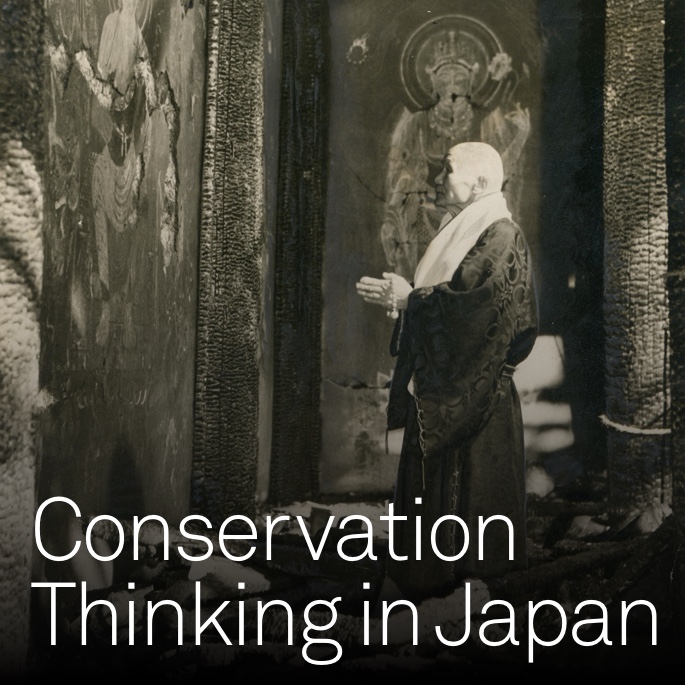|
|

|
|
|
Conservation Thinking in Japan brings together scholars from Japan and the United States to explore the history of conserving in Japan. Among the topics to be discussed are the role of replicas in a culture of conservation, the relationship between traditional materials and conservation practices, the conservation of wooden sculptures and Buddhist sculptures, the transition from antiquarianism to cultural heritage, the history of heritage legislation, and the relationship between conservation and museums. The afternoon presentations on paintings will constitute a symposium within the symposium, with presentations offering a microhistory of a single painting’s conservation history, a discussion of conservation of Buddhist paintings, and a roundtable discussion with paintings conservators focusing on the way the mounting of paintings—and the different ways conservators are trained to think about mounts—shapes the practice of conservation.
Conservation Thinking in Japan is the first of two days of symposia to focus on the robust and distinctive conservation traditions of Japan and India. When launching Cultures of Conservation in 2012 BGC hoped to foster a dialogue between the field of conservation and scholars of the human sciences and bridge the gulf generated by institutional divisions and the inevitable self-siloing of successful research agendas. The associated research project, “Conserving Active Matter,” then taught us that the ways in which we conceive of “conservation,” like the ways we think about “matter” and “activity,” reflect the shape of European and then Euro-American institutional and intellectual history. The working group on Indigenous ontologies of matter made us aware that the Euro-American model described but one set of possibilities. A recognition that the conservation worlds of India and Japan operate differently reinforced our discovery of the provincialness of Western conservation thinking, regardless of how globalized it has become. As Cultures of Conservation comes to an end, we launch exploratory probes into these different conservation worlds in the hope of reshaping an understanding of conservation as a human science.
Conservation Thinking in Japan and Conservation Thinking in India are being held in conjunction with the current exhibition, Conserving Active Matter (March 25–July 10). It is the concluding event in Cultures of Conservation, a ten-year initiative largely funded by The Andrew W. Mellon Foundation, and dedicated to modeling a cross-disciplinary conversation between conservators, conservation scientists, and humanists.

Friday, May 6, 9 am–5:30 pm
38 West 86th Street, Lecture Hall / Zoom

|
|
|
|
9 am
Peter N. Miller (Bard Graduate Center)
Welcome and Introduction
9:10 am
Yukio Lippit (Harvard University)
“The Shōsōin Imperial Treasury and the Cultures of Conservation in Japan”
9:50 am
Coffee Break
10:10 am
Michihiko Mori (Kyoto National Museum)
“The Protection and Conservation of Cultural Heritage During the Edo (1615-1868) and Meiji (1868-1912) Eras: The Foundation of Japan’s Conservation of Cultural Properties”
10:50 am
Noriko Hayakawa (Tokyo National Research Institute for Cultural Properties)
“The Relationship Between Traditional Painting Materials and Techniques in Japan from a Scientific Perspective”
11:30 am
Nobuyuki Kamba (Tokyo National Museum, Emeritus) and Melissa M. Rinne (Kyoto National Museum)
In Conversation
12:30pm
Lunch Break
2 pm
Takeo Oku (Agency for Cultural Affairs)
“The History of the Conservation of Japanese Buddhist Sculpture”
2:40 pm
Ryusuke Masuki (University of Tokyo)
“The Conservation of Buddhist Painting in Japan’s Heian Period (794-1192)”
3:20 pm
Coffee Break
3:40 pm
Miriam Chusid (University of Washington)
“Buddhist Painting Repair as Soteriological Practice: The Case of the Taima mandara”
4:20 pm
Jennifer Perry (Metropolitan Museum of Art), Akiko Niwa (Freer Sackler Galleries, Smithsonian Institution), Keisuke Sugiyama (Tohoku University of Art and Design), and Tanya Uyeda (Museum of Fine Arts, Boston), chaired by Yukio Lippit (Harvard University)
Roundtable on Paintings Conservation
5:30 pm
Reception
|
|
We have opened registration for a limited in-person audience. Bard Graduate Center requires proof of vaccination and photo identification to enter the building. Guests are required to wear masks regardless of vaccination status.
This event will also be available on Zoom. A link will be circulated to registrants in advance of the event. This event will be live with automatic captions.
|
|
COPY AND PASTE CODE BELOW TO MAILCHIMP
|